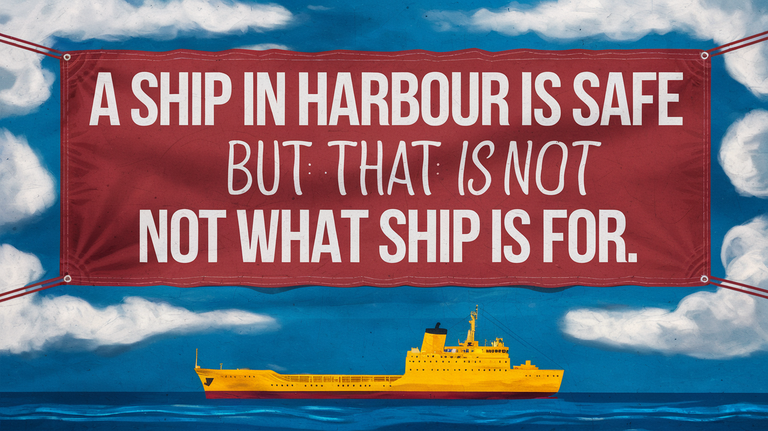The quote “A ship in harbour is safe, but that is not what a ship is for” holds profound meaning that can be applied to various aspects of life. It tells us that while safety is comforting, it often leads to stagnation, and the true purpose of existence lies in embracing challenges. Ships, like people, are meant to venture out into the world, face the unknown, and fulfill their intended purpose. Staying within the comfort zone is tempting, but it limits growth and achievements.
Introduction
Human beings, much like ships, are designed to embark on journeys that involve risk, uncertainty, and challenge. By staying in the safety of a harbor, neither ships nor humans can achieve their true potential. The essence of life lies in taking calculated risks, stepping into the unknown, and growing through experiences. This essay explores the depth of this metaphor in different contexts of life — personal growth, society, exploration, and innovation.
The Comfort Zone and Personal Growth
The concept of a “harbour” can be compared to the comfort zone in an individual’s life. In the safety of the comfort zone, there is little threat of failure, discomfort, or challenge. However, growth does not occur in this safe space. Just like a ship must sail the seas to fulfill its purpose, people must step out of their comfort zones to grow and evolve. Taking on challenges, learning new skills, and facing difficulties are essential for personal development. Success rarely comes without risk, and the fear of failure should not confine a person to a limited existence.
When we challenge ourselves, we learn more about our strengths and weaknesses. For instance, a student may feel safe within the walls of their classroom, excelling at familiar subjects. But only when they attempt challenging courses or take on unfamiliar subjects do they truly learn and grow. Without this leap, their potential remains untapped.
Exploration and Discovery
Historically, mankind has progressed through exploration. Whether it was the discovery of new lands, scientific breakthroughs, or space exploration, stepping out of the comfort zone has always been the key to human advancement. A ship that remains in harbour may be safe, but it will never discover new horizons. Similarly, when humans venture into the unknown, whether geographically, scientifically, or intellectually, they push the boundaries of what is possible.
Consider the Age of Exploration. Navigators like Christopher Columbus and Vasco da Gama set out to explore unknown territories despite the dangers that lay ahead. These explorers could have remained in the safety of their own countries, but the human urge to explore and discover led to some of the most significant advancements in history. If they had remained within the metaphorical harbour, the world as we know it today would be vastly different.
In modern times, space exploration echoes this sentiment. The decision to send humans to the moon or explore Mars is risky. However, these ventures have expanded our understanding of the universe and opened up new possibilities for the future of humanity. A ship in harbour is safe, but such safety never led to the wonders of discovery.
Innovation and Risk-Taking
In the realm of innovation, taking risks is equally important. Entrepreneurs, inventors, and visionaries who step out of their comfort zones often face immense challenges. However, it is through these risks that the world sees revolutionary products and ideas. The comforts of sticking to tradition or remaining stagnant in business do not foster innovation.
Thomas Edison, for example, failed countless times before successfully inventing the light bulb. If he had chosen the safe route and given up after his first few failures, we might still be living in a world without electric light. Entrepreneurs, too, face financial risks, uncertainties, and the possibility of failure. Yet, they understand that innovation requires them to leave the safety of the harbour and venture into uncharted waters.
Society’s Growth Through Challenge
Societies and nations also grow by taking on challenges rather than remaining in the safety of old structures. Movements for social change, civil rights, and equality have always been met with resistance. However, had society remained in the “harbour” of traditional norms and systems, progress would have been impossible.
The civil rights movements, both in India and around the world, are powerful examples. Leaders like Mahatma Gandhi and Martin Luther King Jr. fought against entrenched systems of oppression. They could have stayed silent and safe, but they understood that true progress required risk and the willingness to face opposition. Their actions led to transformative changes in society that have had lasting impacts.
The Fear of Failure
One reason many people and institutions hesitate to leave the harbour is the fear of failure. Failure is often seen as something negative, something to be avoided at all costs. However, failure is an essential part of the growth process. Ships that sail the seas may face storms, rough waters, and other challenges, but these experiences make them stronger and more resilient. Similarly, individuals who experience failure learn valuable lessons that help them succeed in the future.
Steve Jobs, co-founder of Apple, is an example of how failure can lead to eventual success. After being ousted from his own company, he did not retreat into the safety of a stable career or give up on his vision. Instead, he continued to innovate, and when he returned to Apple, he transformed it into one of the most successful companies in the world. Without his willingness to leave the harbour, even after experiencing failure, this success would not have been possible.
Finding the Balance Between Safety and Risk
While it is clear that growth and progress require leaving the safety of the harbour, it is also important to balance risk with prudence. Blindly charging into danger without preparation can lead to disaster. A ship that sails without proper navigation, preparation, or understanding of the seas is likely to encounter unnecessary trouble.
In life, too, it is essential to weigh risks and take calculated steps towards growth. This means being prepared, gaining knowledge, and having a clear vision of the goals one wants to achieve. Taking risks without proper planning can lead to unnecessary setbacks, but avoiding all risks can lead to missed opportunities.
Read More: Poets Are the Unacknowledged Legislators of the World
Conclusion
“A ship in harbour is safe, but that is not what ship is for” is a powerful metaphor that reminds us that safety, while comforting, can lead to stagnation. Personal growth, exploration, innovation, and societal progress all require leaving the comfort zone and facing challenges. Ships, like humans, are designed for adventure, exploration, and fulfilling their purpose. While there is wisdom in balancing risk with preparation, the true essence of life lies in venturing into the unknown and embracing the lessons that come with it. The journey may be difficult, but it is through these challenges that we find our true potential and achieve greatness.







